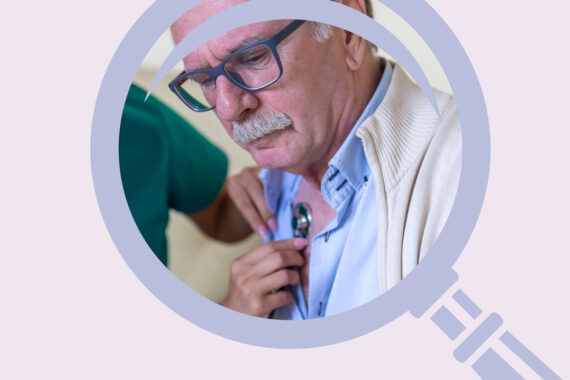Case of the month: What is the cause of this patient’s bradycardia?

In the first of a new monthly series, we are asking readers to help solve this case involving a patient treated for arrhythmia who develops unexplained bradycardia. Post your answers below!
Case: A 64 year old man is found to be experiencing multiple ventricular ectopics when a resting ECG is performed as part of a routine medical (see trace below).
He is referred to a cardiologist who arranges an echocardiogram and Holter monitor. The former reveals possible early stages of cardiomyopathy and the latter confirms a high load of ventricular ectopics comprising ventricular bigeminy, average heart rate 80-100.

The consultant asks you to start him on bisoprolol 2.5mg with the request that his pulse rate is monitored.
The patient has a BP monitor at home which provides a pulse rate and agrees to send the results in for monitoring purposes.
A couple of weeks later he provides these and you note that the pulse is consistently around 40. You contact him and are relieved to hear that he is experiencing no symptoms. You conclude that the bradycardia is a side effect of the beta blocker. As the consultant was very keen that he should be on it, you reduce the dose to 1.25 mg and repeat the process.
His further readings are identical – a pulse of around 40.
You stop the bisoprolol but to your surprise, the pulse rates he subsequently submits remain around 40 – though he still does not complain of shortness of breath, dizziness or any other symptoms. Thinking that he may have gone into heart block you arrange an urgent resting ECG. To your surprise, the result is identical to the original, with an average rate around 80.
What is going on? Share your ideas in the comments box below on what the explanation could be and what action you would take.
Visit Pulse Reference for details on 140 symptoms, including easily searchable symptoms and categories, offering you a free platform to check symptoms and receive potential diagnoses during consultations.
Related Articles
READERS' COMMENTS [4]
Please note, only GPs are permitted to add comments to articles












I’m sure a cardiologist or GPSI will supply the actual clever answer and scoff at my idiocy, but GPs don’t really trust all these cheap ‘n’ cheerful home monitors from Argos or Amazon.
If both ECGs show bigeminy, then presumably the 80bpm consists of 40 sinus plus 40 ectopic beats. This would suggest that the patient’s BP monitor is only picking up the sinus beats, (hence showing 40bpm.), whilst the low dose B blocker had no impact.
Betablocker made no difference, home monitor not good enough to detect ectopics and would have shown 40bpm all along?
Hi, I agree with the previous comments, that the BP monitor did only pick up the sinus beats showing bradycardia. If patient had a pulse oxymeter it would have shown the same.
In their explanation the previous commenters blame the cheap, unreliable machines. I would argue that the clue is in the way the BP monitor measures the heartbeats: it is based on the pressure difference between the systolic and diastolic phase. Often the ectopic beats do not generate cardiac output, they are purely electric activity so only could be detected on the ECG that records the heart’s electrical activity and not on devices that are based on the mechanical changes occurring, like the BP machine.
The patient was referred to cardiology because of an ECG finding on ‘a routine medical.’ Presumably there were no symptoms of heart disease, etc.
An echo shows ‘possible early cardiomyopathy.’
The ECG confirms bigeminy but looks very ‘LBBBlocky‘ and I suspect he will soon develop full blown LBBB.
I wonder if this is a case of alcohol excess. An alcohol history would be very enlightening.
It’s a sobering thought as to why the cardiologist did not enquire about alcohol.
Of course he/she did, but wouldn’t that give the game away?